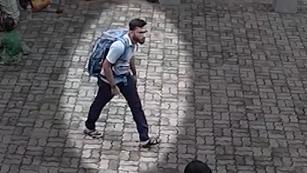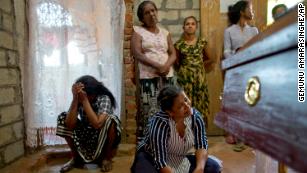by Kitana Ananda and Mythri Jegathesan, CNN, USA, April 28, 2019
Since multiple blasts killed at least 253 people and injured hundreds more in Sri Lanka last Sunday, the government has declared a state of emergency, bringing back draconian anti-terrorism laws that will curtail civil liberties and increase militarization.
In the aftermath of the deadliest attacks in Sri Lanka since the end of a decades-long civil war, innocent Muslims have beentargeted and are leaving multi-religious areas in fear of retaliation. Fake news and misinformation are circulating widely, fueling communal hatred and political power grabs. As members of the government evade responsibility for a major security lapse, Sri Lankan President Maithripala Sirisena has blamed inquires into wartime human rights abuses for making the country vulnerable to attack.
Meanwhile, world leaders have condemned the blasts but have often done so without a critical understanding of Sri Lanka’s history and politics. Some, such as Indian Prime Minister Narendra Modi and the Trump administration, are twisting the attacks to fit their own opportunistic agendas.
The bombings have heightened post-war ethnic tensions and resurfaced civil war traumas amid Sri Lanka’s ongoing political crisis — raising fears of more attacks to come. To help prevent a possible surge in violence, we must understand the Easter Sunday attacks in the context of those legitimate fears and the country’s modern history of majoritarian politics and violence.
Sri Lanka is a pluralistic island of diverse ethnicities and faiths that have historically coexisted. Sinhala communities now make up 75% of Sri Lankans, while Muslims, Sri Lankan Tamils and Hill-Country Tamils (a separate community often referred to as “Indian Tamils”) form the country’s largest ethnic minorities. Malays, Burghers of mixed origin, people of African descent — indigenous Veddas, for example — comprise numerically smaller communities. These groups practice varied forms of Buddhism, Christianity, Islam and Hinduism. However, “divide and rule” colonialism — primarily under the British, and before them, the Dutch and Portuguese — pitted these groups against one another and positioned a Sinhala Buddhist majority against Tamils, Muslims, Burghers and other minorities.
After independence, Sri Lanka endured many forms of violence, with long-lasting impacts on Tamils and Muslims, especially for the women and the most impoverished and caste-oppressed of these minority communities. The long war between the state and Tamil Tiger separatists followed decades of anti-Tamil violence and discrimination, and exacted immense suffering on civilians. When the Tigers bombed buses and airports, the majoritarian state detained many innocent Tamils without cause and tortured or killed them on suspicions of terrorism; in their quest for a monoethnic state, the Tigers mirrored Sinhala nationalists, killing dissidents and expelling Muslims from territory they held in the north.
Sri Lankans also survived two terror-filled periods of Sinhala leftist insurrection and counterinsurgency, as well as the devastating 2004 Indian Ocean tsunami. Tensions between the warring parties escalated in the disaster’s aftermath, deteriorating an already unstable ceasefire. In 2006, the country returned to a brutal war that ended in May 2009 with tens of thousands of Tamil civilian deaths during the government’s military defeat of the Tigers.
Despite the 2015 election of a new president, Maithripala Sirisena, the formation of a coalition government and a constitutional amendment to limit executive power, Sri Lankan minorities remain frustrated by the country’s lack of progress in demilitarization, land return and political power-sharing.
This history of violence must also be understood in relation to the formation of the country’s religious communities. Most Sinhalas are Buddhist and most Tamils are Hindus. Christians, the majority of whom are Roman Catholic, are among Sinhalas, Tamils and various other ethnicities in Sri Lanka. The Easter Sunday bombings targeted St. Anthony’s and St. Sebastian’s, two popular, multiethnic Catholic churches in southwestern Sri Lanka, and Zion, a mostly Tamil Evangelical church in the eastern town of Batticaloa.
Sri Lankan Muslims, on the other hand, identify as a separate ethnic group. Before the Easter attacks, there were no major tensions between Muslims and Christians, and in fact, hardline Sinhala Buddhist extremists like the ultranationalist Bodu Bala Sena have targeted both communities. They have voiced anxieties about Christian “conversions” and the growth of foreign-funded Christianity across the country.
On Palm Sunday, just two weeks before Sunday’s attacks, Sinhala Buddhist nationalists mobbed a Methodist church during services and held the congregation hostage until police arrived. Anti-Muslim hate speech and violence have also been on the rise post-war, with large-scale attacks in central and southern Sri Lanka in 2014 and 2018.
Last Sunday’s attacks brought global attention to Sri Lanka, and with it, news that Muslim communities had repeatedly warned the state about the NTJ’s sectarian violence. In 2016, the Muslim Council of Sri Lanka notified the government that the NTJ was instigating intra-Muslim violence. In 2017, Muslim civilians staged protests demanding the arrest of the NTJ’s leader. The government ignored their calls for action. The NTJ only gained national notoriety in 2018 for vandalizing Buddhist statues in central Sri Lanka.
As families mourn their dead, many Sri Lankans are angered by news that the government failed to heed civilian concerns and intelligence warningsbefore Sunday’s attacks.
Why did the government not respond? Now and leading up to the attacks, the country has been embroiled in a political crisis: a split between President Sirisena and Prime Minister Ranil Wickremesinghe. With presidential elections this year, the possible return to power of Rajapaksa and peace dividends unreached, the crisis is deepening. In this moment, our leaders must pause, listen and reflect on this living history of violence and oppression in order to reroute the country’s future.
The Easter bombings have threatened the fragile peace in post-war Sri Lanka, and the government’s current state of emergency and blame games are exacerbating ethnic tensions and the political crisis. At this critical juncture, Sri Lanka’s leaders and the international community need to listen to Sri Lankan civil society’s calls for strength in unity against all hate.
Sri Lanka must not be pulled into yet another “war on terror” — this time on a global scale — at the expense of minorities’ rights. We must listen to the Sri Lankans who are working across communities to implement long-lasting solutions and support efforts to end divisive, majoritarian politics. The people of Sri Lanka have suffered through generations of violence and war, and they deserve better as they mourn and attempt to heal. The world must support efforts to forge an equitable, peaceful and democratic future for all Sri Lankans.




